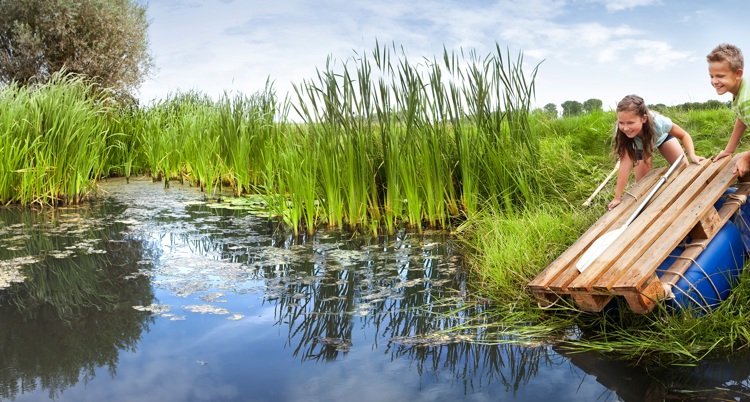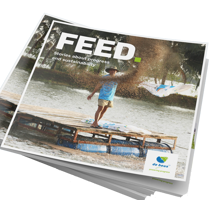တာဝန်ခံမှုအပြည့်ရှိသောအစာထောက်ပံ့ခြင်း
ကမ္ဘာ့လူဦးရေသည်စဉ်ဆက်မပြတ်တိုးပွားလျက်ရှိနေပြီး သက္ကရာဇ် (၂ဝ၅ဝ) ခုနှစ်အရောက်တွင် လူဦးရေပေါင်း ၉.၈ ဘီလီယံခန့်တိုးပွားလာမယ်လို့ပညာရှင်များကခန့်မှန်းတွက်ချက်ထားကြပါတယ်။ တစ်ဖက်တွင်လည်းတိုးပွားလာသောလူဦးရေများအတွက်ဘေးကင်းပြီး ကျန်းမာသောအစားအစာများကိုလက်လှမ်းမီရန်လိုအပ်ချက်များဖြစ်ပေါ်လာပါတယ်။ ကမ္ဘာ့စားနပ်ရိက္ခာအင်စတီကျု၏ခန့်မှန်းချက်အရ ကမ္ဘာလုံးဆိုင်ရာစားနပ်ရိက္ခာလိုအပ်ချက်မှာ ၅၆ ရာခိုင်နှုန်းတိုးလာကာ သား၊ ငါးကိုအခြေခံသောအစားအစာ လိုအပ်ချက် (၇ဝ) ရာခိုင်နှုန်းနီးပါး တိုးလာမည်ဟု ခန့်မှန်းထားကြပါသည်။ ဤသည်မှာကျွန်ုပ်တို့ပါဝင်နေသော အစားအစာထုတ်လုပ်ရေးကွင်းဆက်များကိုသေချာစွာကြည့်ရှုရန် လိုအပ်သည့်အဓိကစိန်ခေါ်မှုတစ်ခုပင်ဖြစ်ပါသည်။

လူဦးရေ (၉.၈) ဘီလီယံကို စဉ်ဆက်မပြတ် ကျွေးမွေးနိုင်ရေးအတွက်စိုက်ပျိုးရေးကဏ္ဍ မြင့်မားသောနိုင်ငံများရှိ လယ်ယာစိုက်ပျိုးရေးအလေ့အကျင့်များရေရှည်တည်တံ့ခိုင်မြဲရေးကို မြှင့်တင်ရန်အထူးလိုအပ်ပါတယ်။
ဆန်းသစ်တီထွင်မှုကိုတွန်းအားပေးရန်နှင့် ရာသီဥတု၊ ပတ်ဝန်းကျင်နှင့်ဒေသခံလူထုအပေါ် အပျက်သဘောဆောင်သောသက်ရောက်မှုများကို လျှော့ချရန်။
တစ်ချိန်တည်းမှာပင် စိုက်ပျိုးရေးကဏ္ဍဖွံ့ဖြိုးတိုးတက်မှုနည်းသောနိုင်ငံများတွင် အစားအစာထုတ်လုပ်မှုကွင်းဆက်များအရှိန်မြှင့်ရန် လိုအပ်ပါသည်။
ကျွန်ုပ်တို့သည်လက်ရှိစိုက်ပျိုးအသုံးပြုနေသောမြေဆီလွှာပေါ်တွင် အထွက်နှုန်းတိုးစေရန်ဂရုတစိုက်ဆောင်ရွက်ပါကထိခိုက်လွယ်သောဂေဟစနစ်များကိုကာကွယ်နိုင်ပြီးသစ်တောပြုန်းတီးမှုကိုလည်းလျှော့ချနိုင်သည်။ ကမ္ဘာလုံးဆိုင်ရာ တိရစ္ဆာန်အစာထွက်ကုန်များထုတ်လုပ်သူအနေဖြင့်တောင်သူလယ်သမားများအား အစားအစာရေရှည်တည်တံ့စွာထုတ်လုပ်နိုင်ရန်လိုအပ်သည့် ထုတ်ကုန်များနှင့်အသိပညာများ ပံ့ပိုးပေးခြင်းဖြင့်အဆိုပါစိန်ခေါ်မှုများကိုလည်းကိုင်တွယ်ဖြေရှင်းနိုင်မည်ဟုကျွနုပ်တို့ယုံကြည်ထားပါတယ်။
ဒီစိန်ခေါ်မှုတွေကိုကိုင်တွယ်ဖြေရှင်းဖို့ကတစ်ကယ့်ကိုခက်ခဲပါလိမ့်မယ်။ ဘေးကင်းလုံခြုံပြီး ကျန်းမာရေးနဲ့ ညီညွတ်တဲ့အစားအစာတွေရရှိရေးဟာ ကမ္ဘာတစ်ဝှမ်းက သန်းပေါင်းများစွာသောလူတွေရဲ့နေ့စဉ်ရုန်းကန်မှုပါ။ စိုက်ပျိုးရေးလုပ်ငန်းသည် လက်ရှိတွင် ကမ္ဘာပေါ်ရှိအသီးအရွက်စိုက်ပျိုးမြေ၏ထက်ဝက်နီးပါးကိုအသုံးပြုနေပြီးစိုက်ပျိုးရေးနှင့် ဆက်စပ်မြေယာအသုံးပြုမှုပြောင်းလဲမှုသည်နှစ်စဉ်ဖန်လုံအိမ်ဓာတ်ငွေ့ထုတ်လွှတ်မှု၏ လေးပုံတစ်ပုံကို ထုတ်လွှတ်ပေးလျက်ရှိနေပါသည်။ ထို့ကြောင့်ကျွန်ုပ်တို့၏ အစားအစာထုတ်လုပ်မှုကွင်းဆက်များ ပိုမိုထိရောက်ပြီးရေရှည်တည်တန့်ရန်အတွက်အထူးအရေးကြီးတယ်ဆိုတာမေးခွန်းထုတ်စရာမလိုအပ်တော့ပေ။
တာဝန်ယူမှု တာဝန်ခံမှုအပြည့်ရှိသော အစာထောက်ပံ့ခြင်းအစီအစဉ်။
ဘေးကင်းပြီးကျန်းမာရေးနှင့်ညီညွတ်သောအစားအစာများရရှိနိုင်မှုနှင့်သုံးစွဲနိုင်မှုအပေါ် ကျွန်ုပ်တို့၏ပံ့ပိုးကူညီမှုကိုရေရှည်တည်တံ့စေရန်အတွက်ကျွန်ုပ်တို့သည် ကျွန်ုပ်တို့၏ ကိုယ်ပိုင်ရေရှည်တည်တံ့မှုအစီအစဉ် (Responsible Feeding Program) ကိုတီထွင်ထားရှိပါသည်။
တာဝန်ယူမှုရှိသောအစာထောက်ပံ့ခြင်းအစီအစဉ်သည်ကျွန်ုပ်တို့အားအခွင့်အလမ်းများကို ရှာဖွေကာဦးစားပေးလုပ်ဆောင်စေပြီး ဒေသခံလူထုအပေါ်သက်ရောက်မှုရှိသော လုပ်ဆောင်ချက်များကိုလည်းအာရုံစိုက်စေပါသည်။
ထို့ကြောင့်ကျွန်ုပ်တို့သည်ကျွန်ုပ်တို့၏ကမ္ဘတစ်ဝှမ်းလုံးရှိ လုပ်ငန်းယူနစ်များအား၎င်းတို့၏ဈေးကွက်နှင့်အကိုက်ညီဆုံးဖြစ်သည့် ပြဿနာများကို အကဲဖြတ်ရန်လိုအပ်မည့်ကိရိယာများကိုကူညီထောက်ပံ့ပေးပြီး ၎င်းတို့၏ ထောက်ပံ့မှုကွင်းဆက်များတွင်တန်ဖိုးများဖန်တီးရန်နှင့်ဒေသတွင်းပါဝင်ပတ်သက်သူများ၏ မျှော်လင့်ချက်များနှင့်ကိုက်ညီသည့် မဟာဗျူဟာများနှင့်လှုပ်ရှားမှုများကို ပြုစုပျိုးထောင်ပေးရန်လည်းကြိုးစားပေးလျက်ရှိနေပါသည်။
ကမ္ဘာလုံးဆိုင်ရာရေရှည်တည်တံ့မှုဦးစားပေးအစီအစဉ်
Sustainable development goals
The United Nations Sustainable Development Goals introduced in 2015 are widely recognised as a blueprint for a better world for people all over the world. At De Heus, we are proud to contribute to achieving several of the Sustainable Development goals. Starting new operations in countries where the agricultural sector is still developing creates opportunities for local farmers, who gain access to high quality feed or can sell raw materials locally. Strengthening local economies, working as a flywheel for the development and further professionalisation of their businesses and their local communities. The opening of the first multipurpose animal feed production plant by a European company in Ghana in autumn 2020 is an example of this contribution.
Global challenges
How do we increase the global production of food in a sustainable manner? According to the World Resources Institute, there a three very large gaps that we need to bridge to produce enough safe and healthy food by 2050.
The food gap: the difference between the amount of food produced in 2010 and the amount needed to meet demand in 2050. Estimated to be 7,400 trillion calories. Which is 56 percent more crop calories than produced in 2010.
The land gap: the difference between the global agricultural land area in 2010 and the area required in 2050, assuming crop and pasture yields continue to grow at past rates. Estimated to be 593 million hectares. An area nearly twice the size of India.
The greenhouse gas emissions gap: the difference between the annual emissions likely to come from agriculture and land-use change in 2050. Estimated to be 15 gigatons of carbon dioxide equivalent.
Global challenges
Towards a sustainable future
Feed for food
We collaborate with customers and partners to keep animals healthy whilst optimising the production of safe and healthy animal proteins. Through knowledge sharing, we continually improve the conversion of animal feed into animal protein and professionalise farmers’ business. We contribute to the accessibility of safe and nutritionally rich food that is produced sustainably. The Feed for Food pillar covers activities on the following topics: food safety, feed conversion, animal health, reduction of antibiotics, use of residual flows.
Sustainable supply chain
We work together with customers and partners in the value chain on a sustainable supply chain from raw materials to food. We collaborate with key partners in the animal protein supply chain to make our supply chain more sustainable by developing new agricultural practices and business concepts, making efficient use of natural resources and reducing GHG emissions. The Sustainable Supply Chain pillar covers activities on the following topics: origin of raw materials, climate, i.e., energy usage and greenhouse gases, water and waste, ecosystems and biodiversity, and animal welfare.
Fostering communities
We have a positive impact on the development of local communities and economies and stimulate local entrepreneurship. Through our core activities, we add economic and social value to local communities. We strengthen their economic position and support the personal development of farmer-entrepreneurs and their families. The Fostering Communities pillar covers activities on the following topics: local communities, i.e., living standards, education, social services, infrastructure, entrepreneurship.
Thriving employees
We provide a safe and inspiring working environment for our employees, actively stimulate lifelong learning and empower our employees to positively contribute to society. The Thriving Employees pillar covers activities on the following topics: working conditions, working environment, inclusion, i.e., diversity, professional development, leadership
FEED. Magazine
ဤမဂ္ဂဇင်းတွင်၊ ကျွန်ုပ်တို့သည်ကမ္ဘာတစ်ဝှမ်းရှိ De Heus လုပ်ငန်းယူနစ်များမှတိုးတက်မှုနှင့် ရေရှည်တည်တံ့မှုဆိုင်ရာဇာတ်လမ်းတိုများကိုမျှဝေပေးထားပါသည်။
